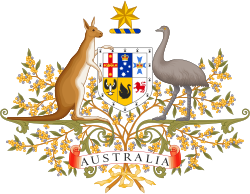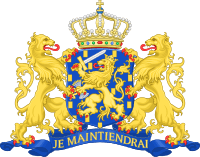Australia–Netherlands relations
Australia–Netherlands relations refer to bilateral relations between Australia and the Netherlands. Australia has an embassy in The Hague. The Netherlands has an embassy in Canberra. The two countries communicate and cooperate on a range of issues, including counterterrorism, climate change, human rights, and the Millennium Development Goals.[1] In 2001 the countries signed an agreement on social security for those who have lived or worked in both countries.[1]
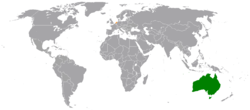 | |
Australia |
Netherlands |
|---|---|
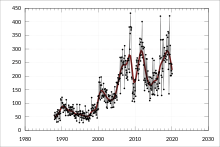
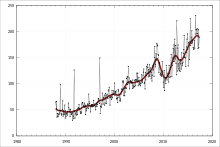
During the period 1947–1971 about 160,001 Dutch people emigrated to Australia, and As of 2006 there are around 90,000 Australians of Dutch descent.[2]
Since 2018, the Dutch Ambassador is Ms Marion Derckx.
History
During the period 1606-1770, Dutch seafarers visited Australia numerous times.[2]
The first recorded European sighting of the Australian mainland, and the first recorded European landfall on the Australian continent (in 1606), are attributed to the Dutch.[3] The first ship and crew to chart the Australian coast and meet with Aboriginal people was the Duyfken captained by Dutch navigator, Willem Janszoon.[4] The Dutch charted the whole of the western and northern coastlines and named the island continent "New Holland" during the 17th century, but made no attempt at settlement.[5]
During and immediately post the second world war, the Netherlands East Indies government in exile, was stationed in Wacol, Queensland, and the Netherlands Indies Government Information Service in Melbourne, with the agreement of the then Labor Australian government. Australia was planned as the staging post for re-imposition of colonial rule in Indonesia. However, Australian maritime unions did much to frustrate this, with bans on manning/loading/coaling from September 1946 to a final ending of all bans in July 1949.[6]
Historically, diplomatic issues have arisen over West New Guinea,[7] and Indonesia's independence from the Netherlands (with Australia recognising the Indonesian Republic on 9 July 1947).[8] In 1955, Prime Minister Robert Menzies visited the Netherlands to discuss the issue of West Papua with Dutch officials including the Prime Minister of the Netherlands Willem Drees and Foreign Minister Joseph Luns.[9][10]
References
- "Netherlands country brief". Department of Foreign Affairs and Trade - Australian Government. Retrieved 21 March 2013.
- "400 years of bilateral relations". Holland Focus. Archived from the original on 24 June 2013. Retrieved 19 June 2013.
- Peter Barber; Katherine Barnes; Dr Nigel Erskine (2013). Mapping Our World: Terra Incognita To Australia. National Library of Australia. p. 99. ISBN 978-0-642-27809-8.
- Claire Smith; Heather Burke (2007). Digging It Up Down Under: A Practical Guide to Doing Archaeology in Australia. Springer Science. p. 47. ISBN 978-0-387-35263-3.
- Davison, Hirst & Macintyre, p. 233.
- Lockwood, Rupert (1982). Black Armada: Australia and the Struggle for Indonesian Independence, 1942-49. Sydney: Australasian Book Society. ISBN 978-0-86806-004-0.
- "Australia 'Won't Back' Dutch in Guinea Fight". The Calgary Herald. 24 Jan 1962. Retrieved 19 June 2013.
- Ismail, Sah-Hadiyatan (May 2011). "Australia and the Indonesian Independence". Asian Social Science. Canadian Center of Science and Education. 7 (5): 151–157.
- "Menzies on Tour: Netherlands". Menzies on Tour: Travelling with Robert Menzies, 1950-1959. eScholarship Research Centre, The University of Melbourne. Retrieved 18 December 2014.
- "Mr Menzies arrives in Amsterdam". The Canberra Times. 22 February 1955. p. 1. Retrieved 18 December 2014.
